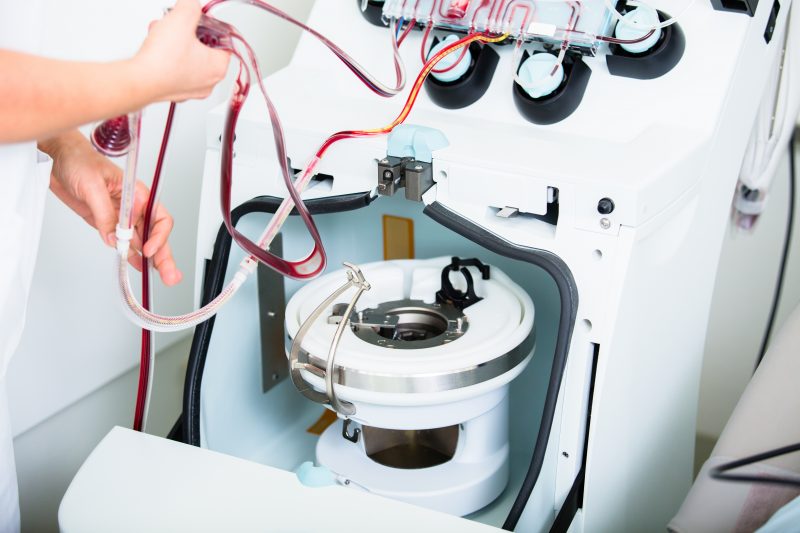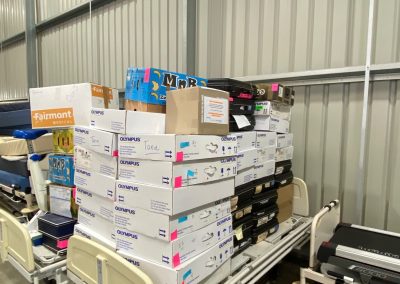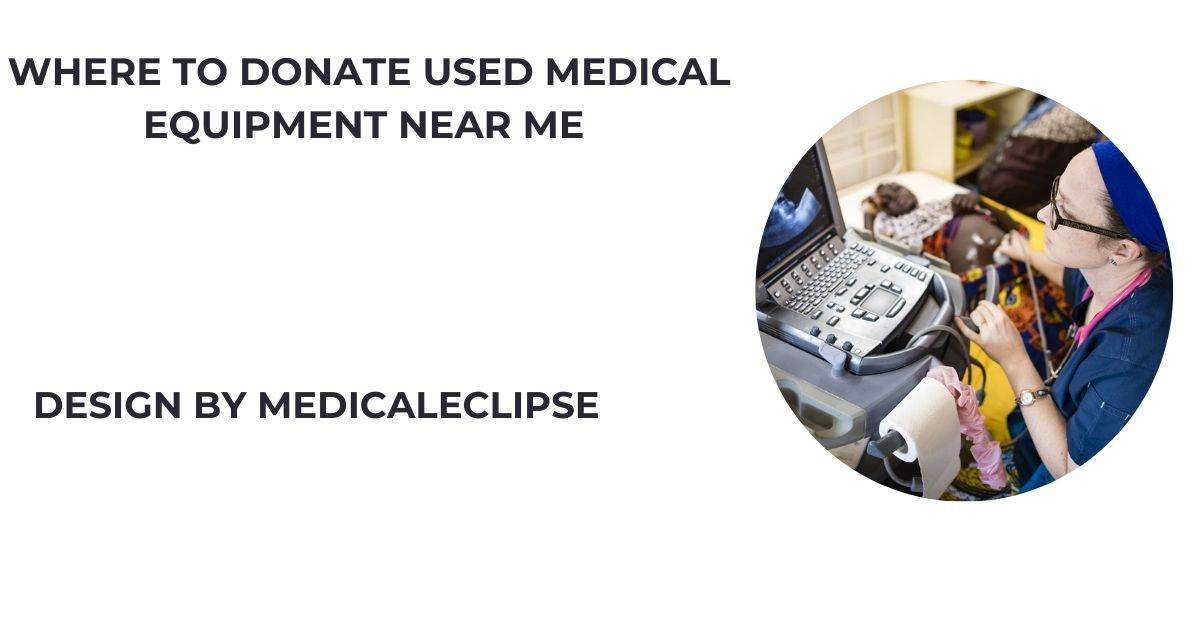You can donate used medical equipment to local charities, hospitals, specialized centers, or online platforms like Facebook Marketplace. Ensure the equipment is clean and in good condition.
Here’s an in-depth guide on where to donate used medical equipment near you and how you can ensure your donation has the greatest impact.
Why Donate Used Medical Equipment?

Medical equipment is often expensive and difficult to replace for individuals, particularly those who are uninsured or underinsured. Many individuals rely on community organizations, charities, and health centers for assistance in acquiring the equipment they need. Donating your used equipment is a simple way to support others, improve their quality of life, and keep your gear out of landfills. By donating, you are not only helping someone in need but also promoting sustainability by recycling medical devices.
Local Charities and Nonprofit Organizations:
Local charities are often the best starting point when looking to donate used medical equipment. Many nonprofit organizations accept donations of gently used medical supplies and redistribute them to people in need. Here are some of the most common organizations that often accept donations:
- Goodwill: Many Goodwill locations accept donations of medical equipment. Items such as walkers, crutches, and even hospital beds are often accepted. Contact your local Goodwill for specific donation guidelines.
- Salvation Army: Similar to Goodwill, the Salvation Army is another prominent charity that may accept donations of used medical devices. They often distribute them to individuals or sell them at discounted rates to fund their programs.
- Red Cross: The Red Cross, a globally recognized humanitarian organization, sometimes collects and redistributes medical equipment. Contact your local chapter to inquire about their donation needs and procedures.
When donating to a charity, it’s essential to confirm the types of medical equipment they accept and their specific drop-off locations. Some charities might have restrictions based on the condition or age of the equipment.
Hospitals and Healthcare Facilities:
Many hospitals, medical centers, and healthcare facilities have community outreach programs that accept donations of used medical equipment. This is particularly true for items like wheelchairs, walkers, and crutches. Here are a few reasons why hospitals and healthcare centers are ideal donation destinations:
- Refurbishment Programs: Some hospitals refurbish medical equipment and reuse it for patients who cannot afford new items.
- Hospice and Palliative Care: Hospitals providing hospice and palliative care often have patients in need of mobility equipment, hospital beds, or other devices that can be reused.
- Medical Missions: Some healthcare facilities have missions or partnerships with organizations that provide equipment to underserved communities both locally and globally.
It’s advisable to call ahead and ask whether they have a donation program, as some hospitals may have specific guidelines for donating medical equipment. Many may accept donations directly at the hospital or through a third-party organization.
Also Read: Exploring Pellet Cookers and When To Use One
Specialized Medical Equipment Donation Centers:
There are several nonprofit organizations that specialize in accepting medical equipment and redistributing it to people in need, either locally or internationally. These centers are often focused on helping individuals with disabilities, the elderly, or underserved communities. Some well-known organizations include:
- MedShare: This organization focuses on collecting and redistributing surplus medical supplies to healthcare institutions around the world, particularly in developing nations. MedShare may accept a wide range of medical equipment, including diagnostic tools and mobility aids.
- Project C.U.R.E.: Project C.U.R.E. collects donated medical equipment and supplies and ships them to healthcare facilities in underdeveloped countries. They accept a wide range of medical equipment, such as surgical instruments, patient monitors, and more.
- DME Reuse Programs: Some regions have specific Durable Medical Equipment (DME) reuse programs that collect used medical equipment to be cleaned, refurbished, and redistributed to those in need. These programs may be local or state-run, and they can help to ensure your equipment is put to good use.
These specialized organizations often have online forms or phone lines where you can check if your equipment is accepted and arrange for donation drop-offs or pickups.
Online Platforms for Donation:

If you’re unable to find a local organization that accepts used medical equipment, online platforms can provide another excellent solution. Several websites and social media platforms allow you to connect with people in your community who might be in need of medical devices. Here are some options:
- Facebook Marketplace: Many local Facebook groups exist where you can offer free medical equipment to those in need. You can post about the equipment you are donating and include a description, along with pickup instructions.
- Craigslist: The “Free” section on Craigslist is another popular place where individuals give away medical equipment they no longer need. If you’re donating an item like a hospital bed or wheelchair, you may be able to find someone in need in your area.
- Nextdoor: This neighborhood-based social network lets you connect with people near you. It can be a great place to offer medical equipment to someone who may benefit from it.
When using online platforms, ensure you are clear about the condition of the item, its intended use, and whether it’s sanitized and in working condition. Be mindful of scams, and only meet with verified individuals in safe, public locations if exchanging items in person.
Assisted Living and Senior Care Centers:
Assisted living facilities and senior care centers often need medical equipment for their residents. Items like walkers, wheelchairs, adjustable beds, and even incontinence supplies are in high demand. Donating to these centers ensures that elderly residents or those with limited mobility can continue to live comfortably.
Before donating, contact the facility to ask about their specific needs and donation policies. Some centers may also accept donations of medical equipment directly from individuals, while others may have partnerships with nonprofit organizations that manage donations.
Religious Organizations and Churches:
Many local churches and religious organizations run outreach programs that accept donated medical equipment. These organizations typically focus on helping people in the local community, especially those facing financial hardship. Religious organizations are particularly good options if you’re looking to donate equipment to people in your immediate area.
Churches often have bulletin boards, newsletters, or community outreach teams that can connect you with individuals or groups in need. Reach out to your local religious institutions and inquire about their donation programs.
Also Read: Fairfield Medical Center – Comprehensive Healthcare Services!
Medical Equipment Reuse Programs:
Some areas have specialized medical equipment reuse programs that are specifically designed to redistribute donated medical devices. These programs typically accept donations of durable medical equipment (DME) and either refurbish or clean it before distributing it to people in need.
Many of these programs are run by state or local government agencies, such as the Durable Medical Equipment Reuse Program in certain states, or by nonprofit groups focused on medical assistance. These programs ensure that your donation goes directly to someone who needs the equipment but cannot afford to purchase it.
Preparing Your Equipment for Donation:
Before donating, it’s important to properly prepare your medical equipment. Here’s a quick checklist to ensure your items are ready:
- Clean and sanitize: Wash and disinfect the equipment to ensure it’s safe for reuse.
- Test the equipment: Check that the equipment works properly. Replace any missing or broken parts if possible.
- Check expiration dates: Some medical equipment, like oxygen tanks or medications, may have expiration dates. Make sure the items are still usable.
- Pack and label: For larger items like hospital beds, consider disassembling them or ensuring they are securely packed for transport.
FAQ’s
1. Where can I donate used medical equipment?
You can donate to local charities, hospitals, specialized centers, or online platforms like Facebook Marketplace or Craigslist.
2. What types of medical equipment can I donate?
Commonly accepted items include wheelchairs, crutches, walkers, hospital beds, and other durable medical equipment.
3. Do hospitals accept medical equipment donations?
Yes, many hospitals accept donations for community outreach, refurbishment, or medical missions.
4. How can I donate equipment online?
Use platforms like Facebook Marketplace, Craigslist, or Nextdoor to connect with local individuals or organizations in need.
5. How should I prepare equipment for donation?
Clean, sanitize, test for functionality, and securely pack your equipment to ensure it’s safe and ready for reuse.
Conclusion
Donating used medical equipment supports those in need, improving lives and promoting sustainability. Whether through charities, hospitals, specialized organizations, or online platforms, your contribution can make a lasting impact. Explore local options, follow donation guidelines, and ensure your equipment reaches the right hands, helping neighbors, patients, or nonprofit programs in meaningful ways.

Leave a Reply